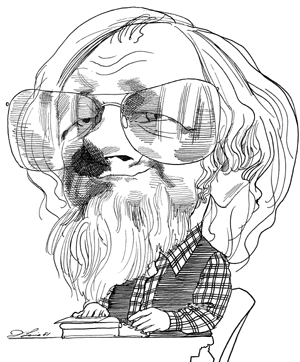Margins consists of dialogue between two men named Carl and Edward. This structure gives the story a quick and snappy pace. Each line of dialogue flows into the next and there are few interruptions. The story is also approximately five pages long making it an easy read.
The title of the story refers to Carl's theory that the width of a person's margins signals something about that person's personality. "The width of the margin shows culture, aestheticism and a sense of values or the lack of them." he says. As the story progresses, Carl and Edward's characters are revealed through their dialogue. For example it is revealed that Edward is white while Carl is black.
The dynamic between the two men is best described as peculiar. Each man references historical figures such as Francois Villon and John Hawkes who is a comptemporary to Barthelme. Barthelme speaks through Carl and Edward like a puppeteer. It becomes clear that Carl and Edward are undeveloped or unrealistic characters. They could be more accurately described as voices. This suggests that character is not what is important to Barthelme because it is simply used as a vehicle to convey ideas.
Carl and Edward continually make snap judgement about each other based on superficial qualities. At one point Carl even says that Edward's handwriting theory is "a superficial approach to the problem." Yet Edward doesn't appear to acknowledge Carl's comment because he goes on to elaborate on the details of his theory. The dialogue is more like two monologues where each character occasionally acknowledges the other. It makes sense that the story ends with Carl and Edward slapping each other in the face. These two men don't seem to have any desire to help each other. Violence is the natural conclusion of this conversation. Thankfully they only slap each other instead of something more destructive. There is more to a conversation than being able to say what you think in an interesting way.
Buy Sixty Stories here:
https://amzn.to/2nyyrQG
The title of the story refers to Carl's theory that the width of a person's margins signals something about that person's personality. "The width of the margin shows culture, aestheticism and a sense of values or the lack of them." he says. As the story progresses, Carl and Edward's characters are revealed through their dialogue. For example it is revealed that Edward is white while Carl is black.
The dynamic between the two men is best described as peculiar. Each man references historical figures such as Francois Villon and John Hawkes who is a comptemporary to Barthelme. Barthelme speaks through Carl and Edward like a puppeteer. It becomes clear that Carl and Edward are undeveloped or unrealistic characters. They could be more accurately described as voices. This suggests that character is not what is important to Barthelme because it is simply used as a vehicle to convey ideas.
 |
| A caricature of Donald Barthelme from the New Yorker |
Carl and Edward continually make snap judgement about each other based on superficial qualities. At one point Carl even says that Edward's handwriting theory is "a superficial approach to the problem." Yet Edward doesn't appear to acknowledge Carl's comment because he goes on to elaborate on the details of his theory. The dialogue is more like two monologues where each character occasionally acknowledges the other. It makes sense that the story ends with Carl and Edward slapping each other in the face. These two men don't seem to have any desire to help each other. Violence is the natural conclusion of this conversation. Thankfully they only slap each other instead of something more destructive. There is more to a conversation than being able to say what you think in an interesting way.
Buy Sixty Stories here:
https://amzn.to/2nyyrQG






